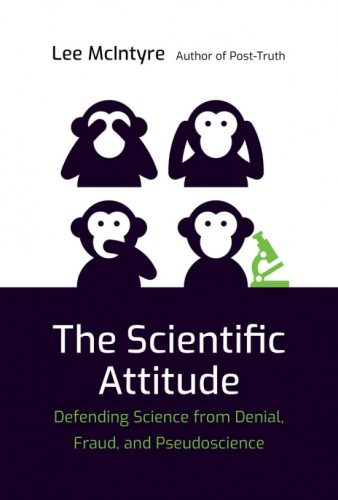Image courtesy of https://leemcintyrebooks.com/
Creationists, climate deniers, and anti-vaxxers are united by their skepticism of science. Science is under attack from those who claim to simply be skeptical, but why should they believe in science? What is it that distinguishes science from other disciplines? In his book, The Scientific Attitude, philosophy of science scholar and Boston University Professor Lee McIntyre posits that it is the attitude of the scientific discipline, the willingness to change one’s mind and adjust theories on the basis of new evidence, that makes science special.
Science deniers often hinge their arguments on a lack of definitive proof. “All of us, not just scientists, can learn to fight back against science denial,” McIntyre said. He explains that, instead of defending science as objective fact, perhaps we should foster the understanding that science is justification based on the available evidence. Science itself exemplifies how beliefs can be adjusted in a rational way based on new information.
It is not reasoning or methodology that makes science
distinctive, but a community that embraces the evaluation and criticism of one
another’s work. “Through the scientific attitude we have found a way to make
our beliefs better by constantly comparing them to evidence,” McIntyre said. In
the book, McIntyre discusses a blog called retractionwatch.com, which reports on
the retractions of scientific papers. Willingness to admit one is wrong or to
publicize the retraction of research is in no way universal. Retractionwatch.com
exemplifies how the scientific community holds one another accountable and
values the fluidity of knowledge.
McIntyre also points towards the rise of modern medicine as an example of the field-transforming power of the scientific attitude. “Medicine underwent a revolution in its scientific attitude in the 19th century, this transformed it into a prime example of what is so reliable about science.” The book acknowledges that some may cast Alexander Fleming’s accidental discovery of penicillin as good fortune. However, McIntyre counters this by pointing out that the understanding of the empirical evidence, subsequent large-scale experiments, and development into a lifesaving drug, were certainly not by chance.
McIntyre makes a convincing case that it is mindset rather than method that distinguishes science from other disciplines. McIntyre’s argument is both appealing and an informative call to arms. The philosophical discussion of demarcation and the scientific method in the early chapters helps to establish the basis of his argument. He thoughtfully convinces the reader to appreciate the examples of failure, fraud, and transformation in the history of science. Furthermore, his contribution “provides the tools for scientists and others who care about science to fight back.”
His writing is thoughtful, logical, and accessible to scientists, philosophers, and others. This book provides a foundation for understanding how science is carried out. Not only does this book present arguments in the defense of science, but perhaps more importantly it celebrates and exemplifies the features that makes science so special.

